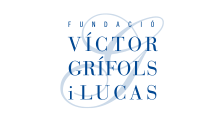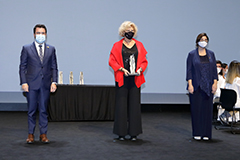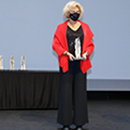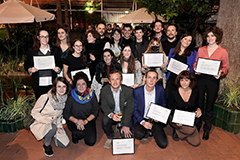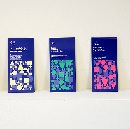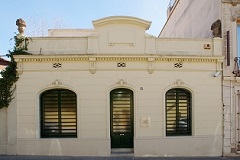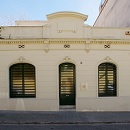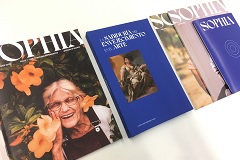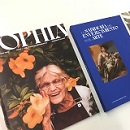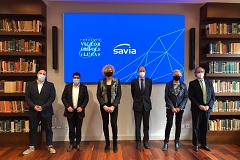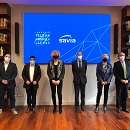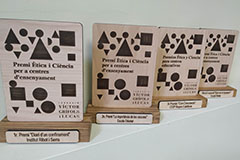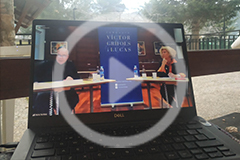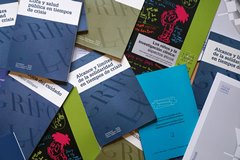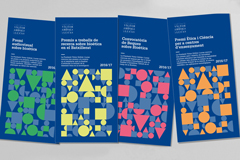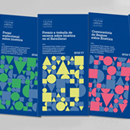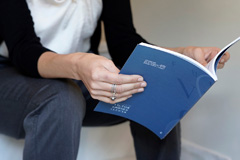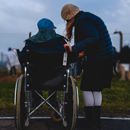Awarded by the Generalitat de Catalunya
The Government of Catalonia and the Catalan Foundation for Research and Innovation (FCRI) have announced the winners of the National Prizes for Research 2020. The Víctor Grífols i Lucas Foundation was recognized in the Scientific Promotion category for its deep and longstanding commitment to supporting the study, research, communication and debate of bioethics in the world of human health and the life sciences.
The awards also recognized the researchers Bonaventura Clotet, director of the IrsiCaixa AIDS Research Institute and head of the Infectious Disease Service at Hospital Germans Trias i Pujol, and Carme Torras, research professor at CSIC and head of the Perception and Manipulation research group at the Institute of Robotics and Industrial Informatics (CSIC-UPC).
Other winners were: Núria Montserrat, ICREA research professor at the Institute of Bioengineering of Catalonia (Prize for Emerging Talent), the journal Mètode (Prize for Scientific Communication), B. Braun Surgical SAU (Prize for Public-Private Partnership in R&D), and the Centre for Genome Regulation (Prize for the Creation of a Science-based Company).
The National Prizes for Research promote social understanding of science and the activities of researchers, teachers, entrepreneurs, communicators and bodies creating science-based companies.
The jury of the Bioethics Prizes and Grants has announced the winners of this year's awards
Grants
María del Mar Cabezas of the University of Salamanca for "Autonomía y vulnerabilidad infantil: Retos bioéticos para la salud psicosocial de la infància desde el Enfoque de las Capacidades". (Childhood autonomy and vulnerability: bioethical challenges for psychosocial health in childhood, from a Capacities Perspective).
Team led by Montserrat Puig of the University of Barcelona for "Impacte de la pandemia COVID19 en el sistema emocional la salut i la qualitat de vida de les persones usuàries de les residències per a persones amb discapacitat". (Impact of the COVID19 pandemic on the emotional system, health and quality of life of users of residences for people with disabilities)
Team led by Rosauro Varo of ISGlobal for "Racismo, medicina colonial y salud global: un estudio cualitativo de opinión sobre ética de las decisiones en investigación sanitaria en África". (Racism, colonial medicine and global health: a qualitative study of opinion on the ethics of decisions in health research in Africa)
Jon Rueda and Ivar Allan Rodríguez of the University of Granada for "Gen-Ética Experimental: Las bases cognitivas de las actitudes morales sobre las tecnologías genéticas y genómicas emergentes". (Experimental Gen-Ethics: The cognitive bases of moral attitudes towards energing genetic and genome technologies)
Núria Vallès, of the Autonomous University of Barcelona, and Júlia Pareto, of the University of Barcelona, for "Controvèrsies ètico-polítiques en la introducció de sistemes d'intel·ligència artificial en salut pública. Un estudi de cas sobre l'estratègia de vacunació contra la COVID-19 a Catalunya". (Ethical-political controversies in the introduction of artificial intelligence systems in public health. A case study of the COVID-19 vaccination strategy in Catalonia)
Team led by Pau Miquel of Fundació per la Recerca Sant Joan de Déu for "Les narratives clíniques de la mort: una oportunitat per al desenvolupament ètic dels professionals?". (Clinical narratives of death: an opportunity for the ethical development of professionals?)
Senior high school prizes
First prize to "Les cookies de la genètica" (Genetics cookies) by Bruna Coll, student at INS Moianès, Moià.
Second prize to "Els ventres de lloguer. La mercantilització del cos de la dona" (Wombs for hire: The commercialization of women's bodies) by Ingrid Jané, student at Escola Ginebró, Llinars del Vallès.
Third prize to "La conflictivitat ètica en els sanitaris d'UCI durant la pandèmia de la COVID-19" (Ethical conflict in ICUs during the COVID-19 pandemic) by Aitana Canto, student at Institut Gabriel Ferrater i Soler, Reus.
Audiovisual prize
Feature film "La nit no fa vigília" (The night does not keep watch) by Laura Corominas, Laura Serra, Clara Serrano, Gerard Simó, Ariadna Ulldemolins and Pau Vall, produced by Massa d'Or.
Special mention for the documentary "Ponto Final" (Full stop) by Miguel López, produced by Ringo Media.
Total submissions were: 38 grants, 146 audiovisual projects, and 11 high school projects. The jury would like to think everyone who submitted a project, and to encourage applicants to take part in future editions of the awards.
With the participation of the Grífols Foundation Chair of Bioethics UVIC-UCC
Fundación Tic Salut Social, a body of the Department of Health of the Government of Catalonia, has presented a new version of its guide to creating mobile apps, following basic principles of ethics, security, accessibility, user-friendliness, interoperability and reliability.
The Grífols Foundation Chair of Bioethics UVic UCC contributed to the guide, in partnership with other universities, and technology, health and social institutions. The guide grew out of the mHealth.cat Mobility Plan, which encourages institutions in the health sector to make care and health services more accessible to users through the deployment of mobile technologies, and facilitates the transformation of care and social processes.
The document is a compendium of recommendations designed to support the creation of effective, user-friendly, safe applications that guarantee the rights and freedoms of users. It encompasses both the technical and the ethnical and functional aspects that any mobile application must incorporate in the initial phases of the development project.
On the ethical side, the document highlights the need for the app development process to be built around respect for individual rights and to incorporate fundamental ethical criteria such as respect for autonomy, proportionality, and data protection.
Consult the guide here
Presentation video
Desenvolupament d'aplicacions mòbils en l'àmbit de la salut i l'atenció a la persona - YouTube
The Chair of Bioethics and the M₃O research group have launched a study to evaluate this question
To what extent has the COVID-19 pandemic influenced first-year students when choosing degree subjects in the social care, health and biomedicine spheres? The TEMPS project, led by the research group Methodology, Methods, Models and Outcomes of Health and Social Sciences (M₃O) and the Grífols Foundation Chair of Bioethics at UVic-UCC, seeks to find an answer to this question.
The study is designed to analyse the trends in matriculations and applications for the first year of degrees in the areas of social care, health and biomedicine in Spain during a six-year period, from 2016–2017 to 2021–2022. The researchers will use a survey to undertake a quantitative evaluation of the influence of the pandemic as a determining factor in the choice of university degrees in these areas, and will follow this up with a qualitative study of the experience of COVID-19 by students in the first year of social care, health and biomedical subjects (nursing, medicine, psychology, physiotherapy, etc.).
Javier Jerez, lead researcher of the TEMPS project, explained that "the aim is to understand the current situation and the impact of the pandemic on the choice of studies". Building on this, the intention is "to propose possible adaptations to the Spanish university system on the basis of the results obtained, in order to respond to current and future challenges".
The study also involves researchers from the universities of Málaga, La Rioja, A Coruña, the Basque Country and the Complutense University in Madrid, and is funded by the Víctor Grífols i Lucas Foundation.
Carmen Tomás-Valiente, Antoni Sitges-Serra i Víctor Montori, nous patronsCarmen Tomás-Valiente, Antoni Sitges-Serra and Víctor Montori, new members
The Víctor Grífols i Lucas Foundation welcomes the new members of our board, three leading figures in the field of bioethics.
- Carmen Tomás-Valiente, Professor of Criminal Law at the University of the Balearic Islands.
- Antoni Sitges-Serra, Professor of Surgery (retired) at the Autonomous University of Barcelona.
- Víctor Montori, university professor, researcher and doctor at the Mayo Clinic (USA).
Collaboration between Elisava and the Víctor Grífols i Lucas Foundation
The Víctor Grífols i Lucas Foundation has partnered with Escuela Universitaria Elisava to provide advice and training to develop publishing projects about ageing. This prestigious design school, part of Pompeu Fabra University, contacted the Foundation at the start of the year after some of its students had expressed a desire to incorporate content, research and analysis in their design project on the subject of ageing.
The Foundation provided a bioethical perspective, delivering a session on subject, giving students the opportunity to ask questions, and advising them on their work in progress.
On 25 February, the students invited the Foundation to attend the presentation of their projects. Working in different groups, organized by subject, the students developed books, catalogues, magazines and online publications, and undertook parallel activities such as performances and reading groups. Both the Foundation and the students' teachers were impressed by the way these projects found fresh ways to address the topic with great sensitivity.
Savia, a company specializing in industrial engineering, has renewed its support of the Víctor Grífols i Lucas Foundation, and for the second year running has made a donation to support the Foundation's bioethics activities.
As part of its corporate responsibility policy, Savia allocates a share of its profits to social activities. This company, which produces cutting-edge technology, values the people who work for it as one of its biggest assets. And, in line with this philosophy, the company is committed to giving back to society in recognition of how much it has received.
Savia visited the Víctor Grífols i Lucas Foundation on 3 March to demonstrate its commitment, at an event attended by managers from both organizations.
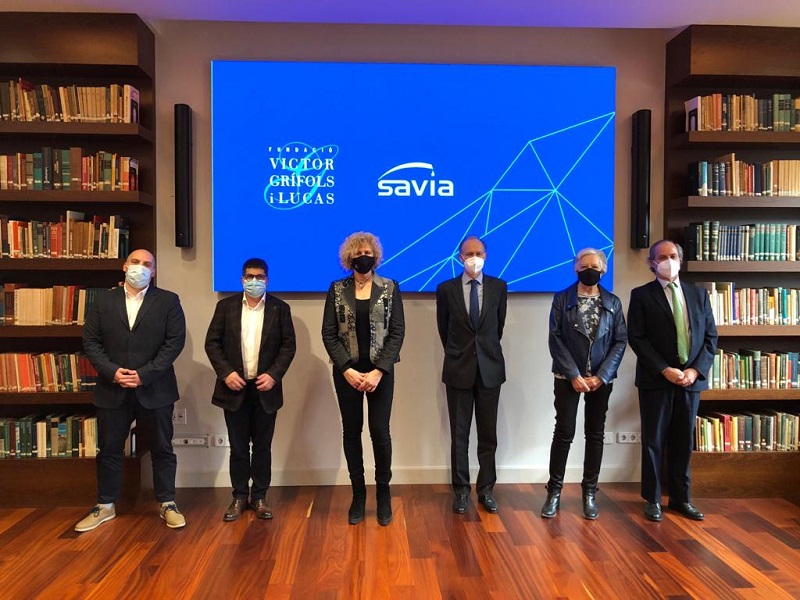
In the photo: Xavi Jordán, Xavi Lladó, Núria Terribas, José Messa, Victòria Camps and Jorge Messa.
Congratulations to Institut Ribot i Serra, Escola Edumar, CEIP Reyes Católicos and Virolai!
The jury has published the winners of the 2020 edition of the Ethics and Science prizes at a virtual event chaired by Victoria Camps and Núria Terribas, with the participation of schools and students. The winners were:
First prize: "Diary of a confinement", Institut Ribot i Serra, Sabadell.
Second prize: "The importance of vaccines", Edumar school, Castelldefels.
Third prize: "CON-CIENCIANDO: an open-air laboratory", CEIP Reyes Católicos, Santa Fe (Granada).
The jury also made special mention of the project, "What makes us human?" by Virolai school, Barcelona.
Videos of the webinars held November 30 and December 2 and 3, now available.
Webinars organized in the partnership between the Spanish Society for Public Health and Health Administration (SESPAS) and Grifols Foundation Chair of Bioethics UVic-UCC.
For several years, we have been organizing an annual seminar with the Spanish Society for Public Health and Health Administration (SESPAS) to discuss key issues in public health. Unfortunately, this year we are unable to meet in person, and we have therefore chosen a virtual format with three sessions opened to public.
- 30 November (16:30 to 18:30h). Citizen participation and COVID
- 2 December (16:30 to 18:30h). Paternalism versus freedom
- 3 December (16:30 a 18:30h). Transparency and communication
Registration from 23 November
GRANTS
Belén Jiménez, of the Open University of Catalonia, and Ignacio Brescó, of Aalborg University, for "Can artificial intelligence help us prepare for death? Ethical questions regarding chatbots for grief and the end of life."
The team led by Laura Martínez of Sant Joan de Déu Research Foundation for "The ethics of biomedical research in the context of COVID-19. (Evaluative quality of CEIm)."
The team led by Anna Falcó and Loris Bonetti, with researchers from the University of Barcelona, the University of Applied Sciences and Arts of Southern Switzerland and the Universitá degli Studi, Milan, for "Influence of the health crisis as a result of COVID-19 in ethical conflicts of intensive care professionals in Catalonia and Lombardy. (Quali – ETIC – COVID-19 Research)."
Rebeca Pardo of the International University of Catalonia and Montse Morcate of the University of Barcelona for "The ethics of images of illness, death and grieving in times of COVID-19."
The team led by Josefina Goberna of the University of Barcelona for "Giving birth in times of the COVID-19 pandemic: Ethical implications of maternity care."
The team led by Andrea Rodríguez-Prat of the International University of Catalonia for "Death in solitude from the perspective of COVID-19 survivors. A phenomenological study."
To the research team of Joaquín Hortal (Clinical Ethics Committee Granada North-east), Maite Cruz (Andalusian School of Public Health) and Javier Padilla ( Guadix High Resolution Hospital) for "Una de cal y otra de arena: citizen suspicion of COVID-19 vaccination and rejection of the flu vaccine among health professionals."
Jordi Muñoz of the University of Barcelona for "Health, democracy and freedom. The ethical and political dilemmas of the pandemic."
AUDIOVISUAL PRIZE
Documentary "Ole mi coño, fighting back against cyber blackmail" by Patricia Franquesa, produced by Gadea Films and Ringo Media.
Special mention for the documentary Segundina Flores by Clara Camprubí, produced by Looky Produccions.
SENIOR HIGH SCHOOL PRIZE
First prize for Genome editing by Carlos Barata, student at La Salle, Girona.
Second prize for Female genital mutilation by Noa Calvo, student at l'Institut Dertosa, Tortosa.
Third prize for The diseases of poverty. Beyond a health problem by Bet Corominas, student at Escola Pia, Mataró.
Total submissions were: 48 grants, 134 audiovisual projects, and 15 high school projects
En 2016, en el Espacio de Reflexión y Acción Ética (ERAE) de la Fundació Pere Mitjans se planteó la cuestión de si era ético y jurídicamente correcto que los profesionales ofrecieran apoyo y acompañamiento a una persona de cincuenta años en una grave situación de discapacidad que deseaba tener relaciones sexuales, para lo cual era necesario contratar a un trabajador sexual. El ERAE analizó y concluyó en un documento que el consentimiento del tutor era si acaso deseable, pero no necesario.
Sin embargo, la amenaza de un poder judicial en general poco comprometido con la diversidad y la libertad humana les llevó a consultarlo con distintos profesionales del derecho, algunos de ellos jueces y fiscales, lo cual aumentó la inseguridad jurídica porque nos dieron opiniones contrapuestas.
Tres años después fue posible someter el documento, a la discusión de los participantes en una jornada organizada por la Fundació Víctor Grífols i Lucas, cuyas aportaciones se publican en el cuaderno "Sexualidad y diversidad funcional".
